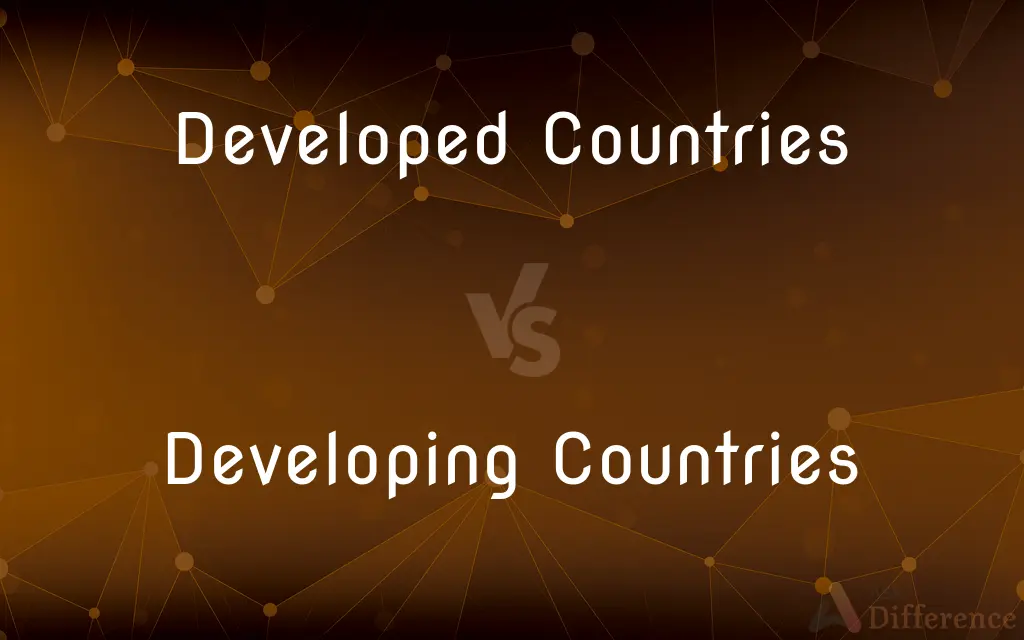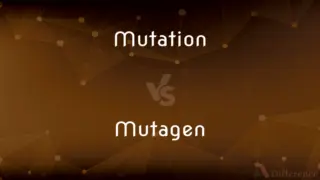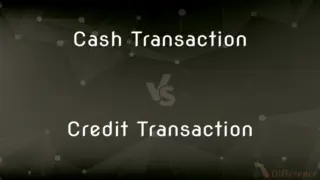Developed Countries vs. Developing Countries — What's the Difference?
By Tayyaba Rehman & Fiza Rafique — Published on October 30, 2023
Developed Countries have high economic growth and advanced technological infrastructures, while Developing Countries are in the process of industrialization and exhibit lower living standards.

Difference Between Developed Countries and Developing Countries
Table of Contents
ADVERTISEMENT
Key Differences
Developed Countries boast advanced economies, often showcasing high GDP per capita and extensive industrialization. On the flip side, Developing Countries are on a trajectory of growth, but they have yet to reach the economic milestones characteristic of their developed counterparts.
Developed Countries often have a high standard of living, comprehensive healthcare, and advanced educational systems. In contrast, Developing Countries might grapple with basic healthcare needs, and their educational infrastructures can be less developed.
The infrastructures in Developed Countries are typically sophisticated, encompassing efficient transportation, communication, and energy systems. Meanwhile, Developing Countries might still be laying the groundwork for such expansive infrastructures, often facing challenges in their establishment.
Unemployment rates in Developed Countries are generally lower than in Developing Countries. Also, developed nations usually exhibit a more diverse job market and greater employment stability, whereas Developing Countries might confront challenges like underemployment or seasonal job fluctuations.
In essence, Developed Countries have achieved a level of economic maturity, stability, and technological advancement. In contrast, Developing Countries are in a transition phase, seeking to enhance their economies, infrastructures, and overall quality of life.
ADVERTISEMENT
Comparison Chart
Economic Growth
High economic growth and stability
In the process of industrialization
Infrastructure
Advanced technological infrastructures
Still developing basic infrastructures
Standard of Living
High, with comprehensive services
Varies, but generally lower
Healthcare & Education
Advanced healthcare and educational systems
Developing healthcare and educational systems
Employment
Diverse job market and lower unemployment
Challenges with unemployment and underemployment
Compare with Definitions
Developed Countries
Countries with diversified industrial sectors.
The economy of Developed Countries isn't reliant on a single industry.
Developing Countries
Countries with emerging infrastructures.
Access to clean water is still a challenge in some Developing Countries.
Developed Countries
Nations exhibiting economic stability and growth.
Developed Countries often have low inflation rates.
Developing Countries
Nations with varying but generally lower living standards.
The income disparity in Developing Countries can be significant.
Developed Countries
Nations with advanced economies and high living standards.
Many Developed Countries offer universal healthcare.
Developing Countries
Nations improving their educational and healthcare systems.
Immunization campaigns are crucial in many Developing Countries.
Developed Countries
Countries with mature technological infrastructures.
The internet speed in Developed Countries tends to be faster.
Developing Countries
Countries working towards diversifying their economies.
Developing Countries are seeking foreign investments to boost growth.
Developed Countries
Nations with advanced educational and healthcare systems.
Literacy rates in Developed Countries are usually very high.
Developing Countries
Nations undergoing economic growth and industrialization.
Many Developing Countries rely heavily on agriculture.
Common Curiosities
Why are Developing Countries called "developing"?
They are in the process of economic, infrastructural, and social growth but haven't reached the standards of developed nations.
What are the main challenges for Developing Countries?
They often face challenges like poverty, healthcare issues, and infrastructure development.
Do Developed Countries have a higher standard of living?
Generally, yes. Developed Countries typically offer better services and higher living standards.
Is industrialization a hallmark of Developed Countries?
Yes, Developed Countries are typically highly industrialized with diverse economic sectors.
Can a country transition from being developing to developed?
Absolutely. Many countries have made this transition with economic growth and development.
Are Developed Countries always wealthy?
While they have higher GDPs, wealth distribution can still be an issue.
Is literacy rate higher in Developed Countries?
Typically, yes. Developed Countries generally have higher literacy rates and better educational systems.
What's the main difference in healthcare?
Developed Countries often have advanced healthcare, while Developing Countries may lack basic services.
Is technology access better in Developed Countries?
Generally, yes. Developed Countries usually have more advanced and widespread technology access.
What defines Developed Countries in terms of economy?
Developed Countries have advanced, stable economies with high GDP per capita.
Can cultural richness define a Developed Country?
While cultural richness is valuable, "developed" typically refers to economic and infrastructural factors.
Do Developing Countries have faster population growth?
Often, yes. Developing Countries might have higher birth rates and younger populations.
Are Developing Countries primarily agrarian?
Many rely heavily on agriculture, but they are diversifying their economies.
Are there exceptions to these classifications?
Yes, development is complex and some countries might not fit neatly into these categories.
Do Developed Countries aid Developing Countries?
Many offer aid, investments, and developmental assistance to Developing Countries.
Share Your Discovery

Previous Comparison
Mutation vs. Mutagen
Next Comparison
Cash Transaction vs. Credit TransactionAuthor Spotlight
Written by
Tayyaba RehmanTayyaba Rehman is a distinguished writer, currently serving as a primary contributor to askdifference.com. As a researcher in semantics and etymology, Tayyaba's passion for the complexity of languages and their distinctions has found a perfect home on the platform. Tayyaba delves into the intricacies of language, distinguishing between commonly confused words and phrases, thereby providing clarity for readers worldwide.
Co-written by
Fiza RafiqueFiza Rafique is a skilled content writer at AskDifference.com, where she meticulously refines and enhances written pieces. Drawing from her vast editorial expertise, Fiza ensures clarity, accuracy, and precision in every article. Passionate about language, she continually seeks to elevate the quality of content for readers worldwide.












































